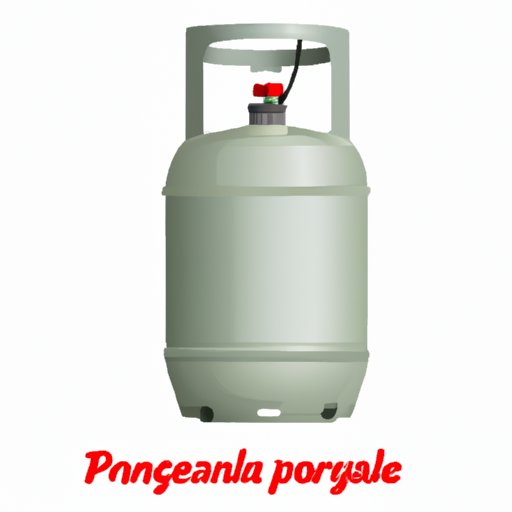
Introduction
When it comes to using propane, whether for grilling, heating, or other purposes, people often encounter the need to know how much a gallon of propane weighs. Perhaps you’re trying to transport a propane cylinder and need to know if you can safely load it into your vehicle, or maybe you’re simply curious about the science behind propane weight. Whatever your reason, understanding how much a gallon of propane weighs can be helpful for a variety of reasons. So, let’s dive into the science and importance of propane weight.
The Science Behind Propane Weight: Exploring the Factors that Affect a Gallon of Propane’s Measurement
To understand how much a gallon of propane weighs, we first need to understand the properties of propane that affect its weight. Propane is a gas that is compressed into a liquid state for storage and transport. The weight of propane is influenced by two main factors: density and temperature.
Density refers to how much mass is contained within a certain volume of propane. The denser the propane, the more weight it will have per gallon. However, temperature also plays a role in propane weight. As temperature increases, propane expands and becomes less dense, resulting in less weight per gallon.
The weight of propane can also vary depending on the size of the propane cylinder and the amount of propane inside. Additionally, the weight of the cylinder itself must be taken into account when calculating the overall weight of a propane cylinder.
How to Calculate the Weight of a Gallon of Propane: A Step-by-Step Guide
To calculate the weight of a gallon of propane, you need to know the propane’s density and the temperature at which it is being measured. The formula for calculating the weight of a gallon of propane is as follows:
Weight = Density x Volume
To use this formula, follow these steps:
1. Determine the density of the propane: Propane has a density of approximately 4.2 pounds per gallon (lb/gal) at 60 degrees Fahrenheit (°F), which is often used as a standard measurement.
2. Measure the volume of the propane in gallons: This can be done by visually checking the gauge on the propane cylinder or by using a measuring container.
3. Multiply the density by the volume: Simply multiply the density (4.2 lb/gal) by the volume (measured in gallons) to get the weight of the propane in pounds.
For example, if you have a 20-gallon propane cylinder at 60°F, the weight of the propane inside would be calculated as follows:
Weight = 4.2 lb/gal x 20 gal
Weight = 84 pounds
Weight Matters: Why Knowing How Much a Gallon of Propane Weighs is Important for Homeowners
Knowing how much a gallon of propane weighs is important for homeowners for several reasons. For transportation purposes, it is essential to know the weight of a propane cylinder before loading it into a vehicle. Overloading a vehicle can be dangerous and illegal, so being aware of the weight of propane cylinders is crucial when transporting them.
Additionally, knowing the weight of a propane cylinder is important for storage purposes. Storing too many cylinders in one location or improperly storing cylinders can result in damage or injury. Understanding the weight of propane cylinders can help homeowners make informed decisions about how many cylinders they can safely store and where they should be stored.
Safety is another important reason to know how much a gallon of propane weighs. Propane cylinders of varying weights require different handling procedures, so being aware of the weight of a cylinder can help homeowners and professionals handle them safely.
Comparing Propane to Other Fuels: How a Gallon of Propane’s Weight Compares to Gasoline, Diesel, and Natural Gas
In addition to understanding the weight of propane, it can also be helpful to compare it to other common fuels. Gasoline, diesel, and natural gas are some of the most popular fuels used in various applications.
Gasoline weighs approximately 6.1 pounds per gallon, while diesel weighs approximately 7.1 pounds per gallon. Natural gas, however, is measured in cubic feet (ft³) rather than gallons or pounds. One cubic foot of natural gas weighs approximately 0.01 pounds, which means that it takes a lot more natural gas to provide the same amount of energy as propane.
Understanding how the weight of propane compares to other fuels can help homeowners choose the best fuel for their needs, as well as make informed decisions about fuel transportation and storage.
The Importance of Proper Gas Cylinder Handling: Understanding the Weight of Propane and Safety Recommendations
Proper handling of propane cylinders is crucial for safety. Propane cylinders can be heavy and awkward to handle, and improper handling can result in injury or even explosions. Here are some safety recommendations for handling propane cylinders:
– Always use appropriate personal protective equipment (PPE), such as gloves and eye protection, when handling propane cylinders.
– Keep cylinders upright and prevent them from falling over.
– Make sure the propane cylinder is secured before transporting it.
– Avoid transporting cylinders in the passenger compartment of a vehicle – instead, place them in the trunk or in the bed of a truck.
– Always use an appropriate regulator when connecting a propane cylinder to an appliance.
– Store propane cylinders in a well-ventilated area away from sources of heat or ignition.
By following these safety recommendations, homeowners can ensure that they handle propane cylinders safely and avoid dangerous situations.
Conclusion
Knowing how much a gallon of propane weighs is important for homeowners for a variety of reasons, including transportation, storage, and safety. By understanding the science behind propane weight and knowing how to calculate it, homeowners can make informed decisions about propane use and handling. Remember to always follow safety recommendations when handling propane cylinders, and enjoy the convenience and energy efficiency that propane provides.




